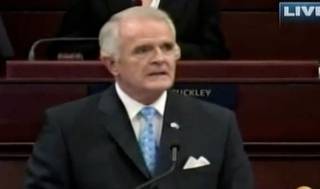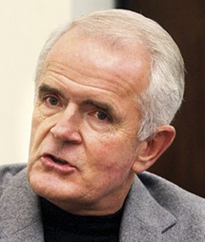Wednesday, March 4, 2009 | 2 a.m.
Sun archives
- Buckley: State could be down another $100 million (3-12-2009)
- The first major bellwether tax vote of the session ... (2-23-2009)
- Gibbons shunned by state lawmakers (2-13-2009)
Sun archives
State of the State 2009

Viewing video requires the latest version of Adobe's Flash Player
Gov. Jim Gibbons’ administration thought it had a smart idea, one that would bring an additional $31 million to the Nevada treasury at a time of dire need.
The state would require casinos to pay taxes on markers — credit issued to gamblers — at the moment they are extended. Currently, the taxes are paid when the loans are paid off.
The change wouldn’t increase the tax, but it would speed up its delivery, which would help the state weather the recession.
It was a clever move. But it had a flaw. Casino companies weren’t consulted.
Once their lobbyists heard about the plan on Jan. 15, the day Gibbons gave his State of the State speech, they objected and Gibbons soon scuttled the plan.
In the great scheme of things, the state is no poorer than it was before. The money will arrive, just later than the state had hoped.
The idea is worth examining, however, because it illustrates something that has become clear in the 4 1/2 weeks of budget hearings that have gone on in the capital. Casino companies and local governments, rural legislators, sheriffs and even top state administrators say they were cut out of the budgeting process.
The budget was built largely in isolation.
In many ways, Gibbons’ staff members faced a supremely difficult task. They were told to prepare a budget with 36 percent cuts compared with what was approved in 2007.
In doing this, they tried to avoid deep cuts to health care services and K-12 education. Instead, they looked at large cuts to higher education’s budget, reductions of state workers’ and teachers’ pay and consolidating some services.
The administration scrambled to fill the $2.36 billion budget as the economy continued to sink. Gibbons continued to vow not to raise taxes, but he did not attend any budget meetings until the document was almost finalized.
Democrats and Republicans have been critical of the budget and promised to restore some of the cut funding. They have not said how they would pay to undo the cuts. Assembly Speaker Barbara Buckley this week would not concede that a tax increase is necessary.
Still, legislators have noted that the budget was prepared without much input.
“Even unpopular decisions are received better if people believe that their voice has been heard,” Assemblywoman Sheila Leslie, D-Reno, said. “The testimony we are receiving repeatedly is that people were not consulted about the potential impacts these budget decisions will have, and many of them are frustrated and angry.”
In response, a Gibbons spokesman said the administration had faced a Herculean task and did the best it could under the circumstances.
“We did everything we could to prepare people about the budget, because the situation is so dire,” spokesman Dan Burns said. “Hundreds of things have changed. It would have taken hundreds of meetings.”
Nonetheless, the budget came as a big surprise to many sectors.
For instance, Gibbons proposed consolidating police training under the Nevada Public Safety Department by eliminating the Commission on Peace Officers’ Standards and Training.
Sheriffs and police chiefs throughout the state were completely unaware. They came last month to Carson City, in full dress uniform, to testify against the bill.
“The sheriffs and police chiefs were in opposition,” said Richard Clark, the POST commission’s executive director. “There may be a change in direction.”
Gibbons proposed closing a prison work camp in Tonopah. Community leaders in the area said they were never consulted about the effects.
The idea to move up payment of tax on markers came as a surprise to Bill Bible, president of the Nevada Resort Association. He said the industry worried that if it had to pay upfront on the markers, some of which are negotiated down or never repaid, it could cause them to lend less.
Bible, who had served as a state budget director under Richard Bryan in the 1980s, said he can understand the push.
“They put it into the budget at the last moment, and didn’t understand all aspects of the proposal,” Bible said.
Gibbons spokesman Burns said the casino marker advance had been put in the budget in late November or December.
“There were two months’ worth of tax and revenue figures that showed dramatic drops,” Burns said. “It became clear that that (proposal) put an undue burden on that industry at a time they were suffering pay cuts, layoffs, everything else.”
He pointed out Gibbons presented the budget six weeks ago.
“The budget is in the hands of the Legislature,” he said.


Join the Discussion:
Check this out for a full explanation of our conversion to the LiveFyre commenting system and instructions on how to sign up for an account.
Full comments policy